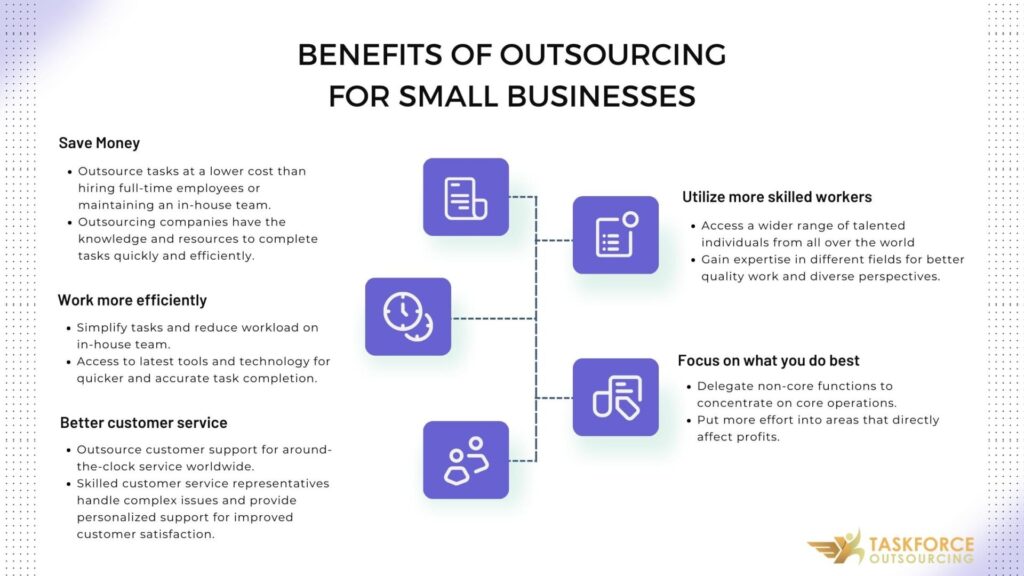Nowadays outsourcing has become a common tactic used by businesses to increase productivity and profitability. This involves working with another business or person to handle particular jobs or projects. Outsourcing has gotten simpler and more affordable as technology has advanced and remote labor has become more common. Five ways in which outsourcing can help your small business succeed will be addressed in this article.
Outsourcing involves contracting individuals or firms outside of your business to perform tasks that would ordinarily be performed by your own staff. A wide range of services, including marketing, manufacturing, and customer service can be outsourced. Businesses that outsource can save money, gain access to a broader selection of skilled workers, work more efficiently, and enjoy other benefits.
Save Money
Lowering costs is one of the key factors driving Businesses to outsource. Compared to bringing on and keeping full-time staff, outsourcing can be significantly more affordable. Due to their knowledge of the industry and access to resources, firms which offer outsourcing solutions can offer specialized skills and experience at a lower price.
Utilize more skilled Workers
Businesses may have access to a greater choice of skilled workers through outsourcing. When hiring personnel internally, your options are typically restricted to local residents. However, outsourcing enables you to collaborate with people from all over the world who are knowledgeable in a variety of disciplines. This may result in higher-caliber work and a broader range of opinions and ideas.
Work More Efficiently
By streamlining processes and lightening the load on your own team, outsourcing can increase the productivity of your business. You can free up more time and resources to concentrate on core operations when you outsource tasks to specialized businesses. In order to perform work efficiently and with precision, outsourcing businesses often have access to the most recent technologies and tools. This can increase productivity while also saving time and money for your company.
Focus on what you do best
Companies can focus on their strengths by outsourcing non-core operations. Businesses can focus more on areas that directly impact their bottom lines by outsourcing jobs that are not vital to their core business operations. For instance, a computer business may decide to outsource its accounting and HR duties so that it can concentrate only on developing and marketing cutting-edge products.
Better Customer Service
Small firms can offer 24/7 service to clients worldwide by outsourcing customer care. Most outsourcing firms employ trained customer care representatives who can manage complex situations and offer individualized support. Small businesses can increase customer satisfaction and retain clients by outsourcing customer service.
For more detail on the Advantages and Disadvantages of Outsourcing, check out our previous articles: Outsourcing 101: A Beginner’s Guide to Understanding the Process and Time is Money: Why Outsourcing Can Save You Both.
Conclusion
Small businesses that seek to streamline their operations, cut expenses, and focus on their core capabilities can find success with outsourcing. Businesses of all sizes can boost productivity, improve customer service, and increase profitability by outsourcing non-core duties to skilled employees around the world. Even though outsourcing might not be appropriate for all small businesses, it is still a practical choice for those looking for growth and success.
Frequently Asked Questions (FAQs)
A: Common outsourcing services include customer support, accounting, HR, marketing, and manufacturing.
A: Outsourcing can be a good strategy for startups that have limited resources and need to focus on core competencies. By outsourcing non-core functions, startups can save money and time.
A: Businesses can ensure quality when outsourcing by carefully vetting potential outsourcing companies, setting clear expectations and timelines, and maintaining open communication.
A: Some potential downsides of outsourcing include language barriers, cultural differences, and reduced control over the outsourced function.
A: Businesses can measure the success of outsourcing by tracking key performance indicators (KPIs) related to the outsourced function. For example, if a business outsources its customer service function, it can track metrics such as response times, customer satisfaction rates, and retention rates. Additionally, businesses can evaluate the impact of outsourcing on their overall efficiency, cost savings, and revenue growth.
Small firms can take use of outsourcing’s advantages to make the most of their resources and accomplish their goals. Small organizations can access a pool of skilled people, save time and money, and increase their operational efficiency by outsourcing non-core services. Before taking this step, small firms should carefully weigh the benefits and drawbacks of outsourcing. In the end, outsourcing can be an effective tool for small businesses seeking to succeed in an increasingly competitive sector.
With an experienced partner like Taskforce Outsourcing by your side, you can streamline your operations without having to worry about any of the complexities associated with managing offshore teams. Let us help you bring your business goals one step closer!
We are committed to quality services at an affordable price, and to helping small businesses grow and succeed through outsourcing. Contact us today to learn how we can be your outsourcing partner and support your business success.


